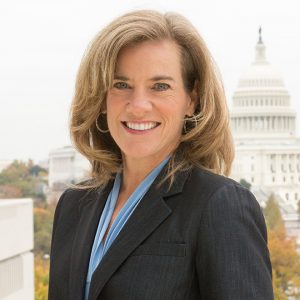
By BJC General Counsel Holly Hollman
 Prior to the initial Senate Judiciary Committee hearings for U.S. Supreme Court nominee Judge Brett Kavanaugh, the BJC reviewed his church-state record and published a report raising concerns about his likely impact on the Court. We asked Committee members to probe further, and we watched the hearings closely. BJC Blogger Don Byrd provided annotated excerpts of relevant testimony on the BJC’s Blog from the Capital (read and watch clips here and here). While overshadowed by other issues, the confirmation hearings revealed a troubling picture for the future of religious liberty. Both in his testimony and in documents released from his prior service in the executive branch, Judge Kavanaugh appears to favor more government support and sponsorship of religion and less concern for individual religious freedom.
Prior to the initial Senate Judiciary Committee hearings for U.S. Supreme Court nominee Judge Brett Kavanaugh, the BJC reviewed his church-state record and published a report raising concerns about his likely impact on the Court. We asked Committee members to probe further, and we watched the hearings closely. BJC Blogger Don Byrd provided annotated excerpts of relevant testimony on the BJC’s Blog from the Capital (read and watch clips here and here). While overshadowed by other issues, the confirmation hearings revealed a troubling picture for the future of religious liberty. Both in his testimony and in documents released from his prior service in the executive branch, Judge Kavanaugh appears to favor more government support and sponsorship of religion and less concern for individual religious freedom.
Protecting against government-sponsored religious exercises, particularly in public schools, is one important way the U.S. Constitution ensures that religious practice is voluntary, not coerced by the government. The Establishment Clause limits the role of government in religion and thereby respects religious differences among citizens. It ensures that government entities, including public schools, do not pick preferred religions to advance or lead in religious exercises. The Court’s rulings on religion in the public schools are clear. There are two long-standing principles, which Kavanaugh summarized in his testimony: “First, school-sponsored prayer is impermissible. Second, student expression is protected.” The BJC agrees and has spent decades advancing those clear principles as the proper balance for protecting religious liberty in the public schools.
Yet, Kavanaugh seemed to lament a decision that struck down a policy providing official prayers at school-sponsored events. As a private lawyer, he filed a brief in support of a policy allowing student-led prayers over a public address system at public school football games. Kavanaugh and Sen. John Cornyn, R-Texas, who argued the case for the school district as Texas Attorney General, were on the losing side when the Supreme Court found the policy violated the Establishment Clause. The BJC supported the challengers, including Mormon and Catholic families, who expect public schools to be neutral toward religion and not use the power of the state to conduct religious exercises.
Instead of explaining how the Court’s ruling in Santa Fe v. Doe (2000) was an application of core principles, Kavanaugh seemed to agree with Sen. Cornyn who recalled Chief Justice William Rehnquist’s dissent that the majority opinion “bristles with hostility to all things religious in public life.” The hearing exchange was similar to Kavanaugh’s views expressed in a recent speech where he spoke with admiration for Rehnquist’s attack on the separation of church and state.
Kavanaugh’s weak view of the Establishment Clause was also demonstrated in documents from his time working for the George W. Bush administration. Documents released during the hearings included emails discussing the Bush administration’s “faith-based initiative.” Kavanaugh argued for a position that would allow government funding of religious programs. This goes well beyond the Bush administration’s policy, which focused on increasing government partnerships with religious organizations while avoiding the unconstitutional funding of religion. Government funding of religious practices would have significant negative consequences for religion and religious liberty.
When Kavanaugh was asked in general about his views on religious liberty, we at the BJC appreciated that he began by referring to the original Constitution’s Article VI, which prohibits any religious test for office. More than once, he stated that the Constitution’s religious liberty protections provide that we are all equal citizens without regard to religion. In response to Sen. Orrin Hatch, R-Utah, who said that some people think religious people shouldn’t work in government because they swear duties to church, Kavanaugh affirmed his constitutional duty. He said he takes an oath to the Constitution, which protects all equally and that his religion has “no relevance to judging.”
When asked about the relationship between the No Establishment and Free Exercise Clauses of the First Amendment, Kavanaugh said that both “support religious freedom” and “preclude coercion.” But, he was hesitant to explain his view of the Establishment Clause beyond noting it was “a complicated body of law.” His testimony and advocacy in positions before becoming a judge suggest little appreciation for how that essential protection against government involvement in religion supports religious liberty for all.
On both sides of the political aisle, religious liberty is praised as foundational. Regardless of religion or political affiliation, many maintain that religious liberty has been a fundamental commitment and source of strength for our country. But too often, political discourse denigrates fundamental aspects of our religious freedom and denies what should be affirmed. The separation of church and state is good for both.
This article appears in the September/October 2018 edition of Report from the Capital. Flip through below to read via Issuu, or click here to read as a PDF.




